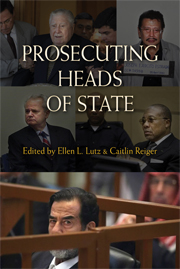Book contents
- Frontmatter
- Contents
- List of Contributors
- About the International Center for Transitional Justice
- Foreword
- Preface
- 1 Introduction
- 2 Prosecutions of Heads of State in Europe
- 3 Prosecutions of Heads of State in Latin America
- 4 The Multiple Prosecutions of Augusto Pinochet
- 5 A Leader Takes Flight: The Indictment of Alberto Fujimori
- 6 Charm and Punishment: How the Philippines' Leading Man Became Its Most Famous Prisoner
- 7 Shifting Legitimacy: The Trials of Frederick Chiluba
- 8 A Justice “Trickle-Down”: Rwanda's First Postgenocide President on Trial
- 9 Justice Squandered? The Trial of Slobodan Milošević
- 10 A Big Man in a Small Cell: Charles Taylor and the Special Court for Sierra Leone
- 11 Political Pedagogy, Baghdad Style: The Dujail Trial of Saddam Hussein
- 12 Conclusion
- APPENDIX: List of Prosecutions of Heads of State or Government since 1990
- Selected Bibliography
- Index
8 - A Justice “Trickle-Down”: Rwanda's First Postgenocide President on Trial
Published online by Cambridge University Press: 06 August 2009
- Frontmatter
- Contents
- List of Contributors
- About the International Center for Transitional Justice
- Foreword
- Preface
- 1 Introduction
- 2 Prosecutions of Heads of State in Europe
- 3 Prosecutions of Heads of State in Latin America
- 4 The Multiple Prosecutions of Augusto Pinochet
- 5 A Leader Takes Flight: The Indictment of Alberto Fujimori
- 6 Charm and Punishment: How the Philippines' Leading Man Became Its Most Famous Prisoner
- 7 Shifting Legitimacy: The Trials of Frederick Chiluba
- 8 A Justice “Trickle-Down”: Rwanda's First Postgenocide President on Trial
- 9 Justice Squandered? The Trial of Slobodan Milošević
- 10 A Big Man in a Small Cell: Charles Taylor and the Special Court for Sierra Leone
- 11 Political Pedagogy, Baghdad Style: The Dujail Trial of Saddam Hussein
- 12 Conclusion
- APPENDIX: List of Prosecutions of Heads of State or Government since 1990
- Selected Bibliography
- Index
Summary
During the fifth commemoration of the 1994 Rwandan genocide, then president Pasteur Bizimungu startled the audience by accusing one of the assembled dignitaries, Bishop Augustin Misago, of genocide. Three years later, the new president, Paul Kagame, used the genocide ceremony in turn to denounce Bizimungu for ethnic “divisionism.” Where as Bishop Misago was acquitted, Bizimungu was convicted and sentenced to fifteen years (ironically, he spent almost five years in Bishop Misago's old prison quarters before being pardoned). All told, Bizimungu can consider himself lucky, having fared better than any of his predecessors in office: Gregoire Kayibanda was starved to death in prison after being overthrown in a military coup in 1973, Juvenal Habyarimana was killed in April 1994 when his plane was shot down, and Theodore Sindukwabo died of cholera in exile after having presided over the genocide.
Bizimungu's trial offers a revealing glimpse of Rwanda's post-genocide transition, which is so often obscured by Western shame and Rwandan spin: an increasingly authoritarian, one-party state has instrumentalized ethnicity and the genocide to silence political opponents and independent civil society organizations. The 2004 trial itself had all the drama of a badly staged show trial: political machinations, ludicrous accusations, recanted confessions, and a predictable ending. Furthermore, like every show trial, it unwittingly showed up the gap between power and legitimacy, between the ruler and the rule of law.
- Type
- Chapter
- Information
- Prosecuting Heads of State , pp. 151 - 175Publisher: Cambridge University PressPrint publication year: 2009



